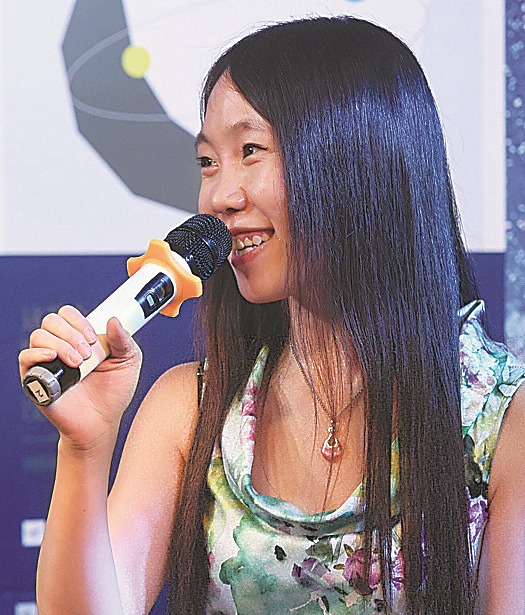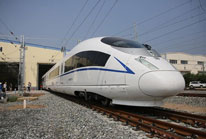

 |
| Hao Jingfang, the winner of this year's Hugo Award, speaks in Beijing in July. (Luo Xiaoguang/Xinhua) |
On Aug. 20, Chinese science fiction writer Hao Jingfang took home the Hugo Award for best novelette with her novel "Folding Beijing." Hao's win came exactly one year after another Chinese writer, Liu Cixin, won the best novel prize for his "The Three-Body Problem."
Many people are wondering whether this series of victories signals the emergence of Chinese science fiction into the greater arena of world literature. Hao said that she hopes winning the award will help to boost the popularity of science fiction in China.
On the same day Hao won the prize, it was also announced at the Shanghai Book Fair that an English version of the whole "The Three-Body Problem" trilogy will be published.
“Since 'The Three-Body Problem' was awarded the Hugo prize last year, we can feel that Chinese science fiction novels have become more influential in the world, and this is somewhat associated with China’s rising economic status,” said Yao Haijun, vice editor-in-chief of Science Fiction World, a monthly science fiction magazine published in China.
Since the publication of its English edition in November 2014, more than 160,000 copies of "The Three-Body Problem," translated by Ken Liu, have been circulated globally. Mainstream Western media, including The New York Times and Wall Street Journal, have also published positive reviews of the book.
But why have foreign readers so suddenly fallen in love with Chinese science fiction? According to Liu Cixin, science fiction is becoming an avenue for the outside world to understand China. Yao agrees, remarking that many American readers are using the genre to speculate on China's future landscape.
“Chinese science fiction is embracing an unprecedented opportunity,” Liu Cixin confirmed.
 World's fastest bullet train to start operating next month
World's fastest bullet train to start operating next month Huangluo: China's 'long hair village'
Huangluo: China's 'long hair village' Spectacular bridge with one of the tallest piers in the world
Spectacular bridge with one of the tallest piers in the world Magnificent view of Hukou Waterfall
Magnificent view of Hukou Waterfall A glimpse of Stride 2016 Zhurihe B military drill
A glimpse of Stride 2016 Zhurihe B military drill US Navy chief tours Liaoning aircraft carrier
US Navy chief tours Liaoning aircraft carrier Chinese American woman wins Miss Michigan
Chinese American woman wins Miss Michigan Centenarian couple takes first wedding photos
Centenarian couple takes first wedding photos Traditional Tibetan costumes presented during fashion show
Traditional Tibetan costumes presented during fashion show Top 10 livable Chinese cities
Top 10 livable Chinese cities Top 20 hottest women in the world in 2014
Top 20 hottest women in the world in 2014 Top 10 hardest languages to learn
Top 10 hardest languages to learn China’s Top 10 Unique Bridges, Highways and Roads
China’s Top 10 Unique Bridges, Highways and Roads Chinese athletes switch nationality for opportunities, welfare
Chinese athletes switch nationality for opportunities, welfare With another Olympic gold, Lang Ping rekindles national pride
With another Olympic gold, Lang Ping rekindles national pride Who holds the purse strings?
Who holds the purse strings? Chinese author Hao Jingfang wins Hugo Award for Best Novelette with ‘Folding Beijing’
Chinese author Hao Jingfang wins Hugo Award for Best Novelette with ‘Folding Beijing’Day|Week